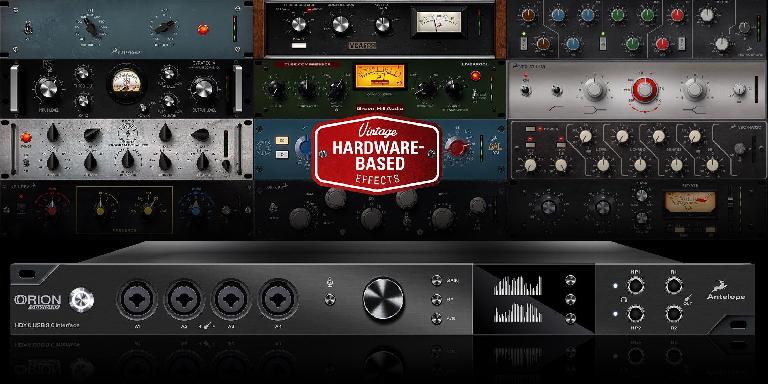Antelope Audio shows no signs of slowing down with their steady releases of solid audio interfaces. The Orion Studio HD is the latest device to join the pack. With a myriad of connection options, this interface looks like a great way to get audio in and out of your computer. I test drove a Studio HD for a few weeks to see how it held up.
The Lowdown
Orion Studio HD has 12 XLR mic/line combo inputs. There are 16 channels of analog out available via DB25, 2 separate sets of stereo monitor outputs, and 2 ReAmp outputs for pro level guitar recording and re-amping. On the digital side you can find a single ADAT optical port as well as a single S/PDIF port. The grand finale, however, is the Pro-Tools friendly HDX port providing 32 channels of digital I/O direct to Pro Tools. There is also a USB3 port on the back for shuttling all of this data to and from your computer.
The Fit And Finish
Antelope Audio gear is always built to last, and the Studio HD is no exception. The unit feels extremely solid, the buttons on the front are designed to last (which is good, because they contain a lot of functionality - more on that later), and the main rotary dial is decent. The front panel screen is sturdy, but the display is a bit low-res for my taste. It’s perfectly functional, though.
I suppose I noticed the screen a bit more on this interface simply because of how much functionality Antelope has packed into the front panel. You can even load up I/O presets right from the unit without having to get involved in the software. Buttons can select various functions, and the single rotary encoder is used for data entry. It’s a simple, effective, and well designed system.
The Sound
If you’re familiar at all with the entire Orion line, you’ll know what to expect with the sound of the Studio HD. The preamps have a stunning amount of headroom, the clocking allows for a very ‘open’ sound upon playback, and the noise floor is simply nonexistent. Honestly, after having the pleasure of reviewing several Orion units so far, I had no doubt that this would be the case.
The Workflow
The workflow, I/O and options are what will differentiate this unit from its brethren. The realistic vintage effect models are growing with every iteration, and I still can’t believe that they are free. The included effects run using the DSP of the hardware, and we’re talking some great compressors, EQs, and amp simulations that sound really fantastic. You can utilize these effects in up to 4 separate zero-latency monitor mxes as well, or use them for tracking. It’s up to you.
As far as control, the software works well, and it’s getting a little easier to use with every version. I’m a fan of their iOS app, simply because navigating the touchscreen is a little faster, but the desktop app works well. It loads up quickly, doesn’t crash, and is very responsive.
Conclusion
The Orion Studio HD is a fantastic audio interface, and an excellent way to get sound in and out of your computer. If you utilize Pro Tools, the value just increases. I wish the screen were a little higher-res, and if the software were simplified just a touch more I think it would be perfect. As far as the sound, it’s truly stellar.
Price: $2,995
Pros: Fantastic sound, sturdy design, physical power button (I’m looking at you, Goliath!), plethora of connections, HDX compatibility, super preamps, guitar ReAmp outputs, multiple zero latency monitor mixes.
Cons: Low-res screen, software has a bit of a learning curve





 © 2024 Ask.Audio
A NonLinear Educating Company
© 2024 Ask.Audio
A NonLinear Educating Company
Discussion
Want to join the discussion?
Create an account or login to get started!